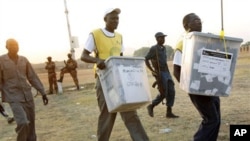South Sudan's National Election Commission (NEC) has set June 30 as the date for this year's general elections.
NEC chair Abednego Akok announced the date at a news conference in Juba on Thursday.
The announcement drew protests from opposition officials, who said widespread insecurity will make it impossible to hold safe and fair elections in June. They also said the millions of dollars that have been earmarked for the elections should be spent on helping the people of South Sudan, not on organizing polls.
At least 10,000 people have been killed and around 1.8 million people have been displaced by fighting in South Sudan, which erupted in December 2013 when a rift between President Salva Kiir and his former deputy, Riek Machar, boiled over into violence. Hundreds of thousands of children have been forced to drop out of school because of the fighting, and hundreds of thousands of South Sudanese face severe food insecurity.
'Joke of the year'
Former political detainee Ezekiel Lol Gatkuoth, who is now deputy foreign affairs secretary in Machar's rebel movement, said holding elections when millions of people are suffering would be unacceptable. He added that insecurity around the country would make it impossible to organize a free and fair vote.
"It is actually the joke of the year," Gatkuoth told South Sudan in Focus.
"It is unacceptable because nobody will be focussing on having elections," he said. "The money that you are using to run an election, you should actually be providing this money to feed your people."
Gatkuoth said because the government does not control many parts of the country, it would be difficult to organize safe and fair elections.
Former justice minister John Luk said the government should focus on ending the year-old conflict before elections are held. "I think holding elections in June is not sensible at all," he said. "The best would be to focus on a serious peace." Like Gatkuoth, he was detained by the government after fighting broke out in Juba on Dec. 15, 2013.
Cheaper alternative
The government last month announced that it has approved a budget of 1.5 billion South Sudanese Pounds ($517 million) for the elections, in which the presidency and all of the seats in the National Assembly will be decided.
Lual Deng, the head of Juba-based think tank, The Ebony Center, said that's a lot of money to spend when South Sudan's oil-dependent economy is in such poor shape after a year of conflict, and with the global price of crude down sharply.
South Sudan's oil production has been cut by around a third since the conflict began. On top of that, the price of oil has fallen from around $108 per barrel in the middle of last year to less than $55 per barrel at the start of 2015.
"I don't see where you're getting that amount of money at this stage," Deng said, referring to the budget allocated for elections.
He suggested that, instead of holding elections, South Sudan's constitution be amended to extend the tenure of the legislature by 36 months.
"The cost of extending the National Assembly would be about 250 million South Sudanese pounds over three years if you take the salaries, the benefits, the associated buildings, the staff, all those things. So it's much, much cheaper in terms of economics," he said.
"I would... extend the tenure of the national legislature and use the remaining 1.26 billion South Sudanese pounds to improve" the country's infrastructure, Deng said.
Information Minister Michael Makuei said last week that, according to South Sudan's transitional constitution, elections must be held this year.
A check of the constitution shows that it does not stipulate that elections must be held by a certain date, but does say that President Kiir's term will come to an end by July 9 of this year. The constitution also says that if no election has been held by then, the presidency will be considered vacant and the vice president will assume the top executive post until a vote is organized.
The transitional constitution of South Sudan also calls for a census to be held ahead of the next general elections, to "determine the number of electoral constituencies for" the vote. Because of the ongoing conflict, that has not happened.
Philip Thon Aleu contributed to this report from Juba.






